小学英语特殊疑问句和一般疑问句的归纳
小学英语特殊疑问句和一般疑问句的归纳

特殊疑问句和一般疑问句的答法一般疑问句通常都是1..以be (am,is,are,)开头2.以Do,Does,Did 开头或以Can开头回答方法:前面用什么提问的就用什么答。
只有两种回答方式:1)肯定的,Yes,主语+ 提问词.2)否定的No,主语+提问词+not.【注意:问句与答句的第一二人称要互换】如:④主语是名字时的答语:看性别,男的用he ,女的用she ,其他的用it 复数就用they。
如:①Is she……? Is he………? Is it……..?Yes, she is.Yes, he is. Yes, it is.No, she isn,t. No, he isn,t. No, it isn,t.②Are they………? Are the monkeys …….?Yes, they are.Yes, they are.No,they aren’t No,they aren’t③Do they………?Does he……..? Did she…….?Yes,they do. Yes,he does. Yes, she did.No,they don’t. No,he doesn’t. No,she didn’t.④Are you……..?Are you……..? Do you…….?Yes, I am.Yes, we are. Yes ,I do. 或Yes,No, I am not. No, we aren’t. No,I don’t. 或No,⑤Does Mike…….? Is ChenJi…..? Do your parents…?Yes ,he does.Yes , she is. Yes, they do.No,he doesn’t. No, she isn’t. No,they don’t.一、专项练习。
1. Did ChenJie read books yesterday?2. Can the girl cook the meals ?—————————————————————————————3.Is he going to swim this afternoon?4. Are they going to take a trip next weend? ————————————————————————————————5.Does he often go to school by bike ? 6. Do you play basketball every weekend? ———————————————————————————————————7. Did Mike do his homework yesterday? 8. Are they playing basketball now?————————————————————————————————一般疑问句及特殊疑问句的总结一般疑问句的定义:用yes或no来回答的疑问句叫一般疑问句。
小学英语特殊疑问句和一般疑问句地归纳

特殊疑问句和一般疑问句的答法一般疑问句通常都是 1..以be (am,is,are,)开头2.以Do,Does,Did 开头或以Can开头回答方法:前面用什么提问的就用什么答。
只有两种回答方式:1)肯定的, Yes,主语 + 提问词.2)否定的 No,主语+提问词+not.【注意:问句与答句的第一二人称要互换】如:④主语是名字时的答语:看性别,男的用he ,女的用she ,其他的用it 复数就用they。
如:①Is she……? Is he………? Is it……..?Yes, she is. Yes, he is. Yes, it is.No, she isn,t. No, he isn,t. No, it isn,t.②Are they………? Are the monkeys …….?Yes, they are. Yes, they are.No,they aren’t No,they aren’t③ Do they………? Does he……..? Did she…….?Yes,they do. Yes,he does. Yes, she did.No,they don’t. No,he doesn’t. No,she didn’t.④Are you……..? Are you……..? Do you…….?Yes, I am. Yes, we are. Yes ,I do. 或 Yes,No, I am not. No, we aren’t. No,I don’t. 或No,⑤Does Mike…….? Is ChenJi…..? Do your parents…?Yes ,he does. Yes , she is. Yes, they do.No,he doesn’t. No, she isn’t. No,they don’t.一、专项练习。
1. Did ChenJie read books yesterday?2. Can the girl cook the meals ?—————————————————————————————3.Is he going to swim this afternoon?4. Are they going to take a trip next weend? ————————————————————————————————5.Does he often go to school by bike ? 6. Do you play basketball every weekend? ———————————————————————————————————7. Did Mike do his homework yesterday? 8. Are they playing basketball now?————————————————————————————————一般疑问句及特殊疑问句的总结一般疑问句的定义:用yes或no来回答的疑问句叫一般疑问句。
小学英语语法---一般疑问句和特殊疑问句ppt课件
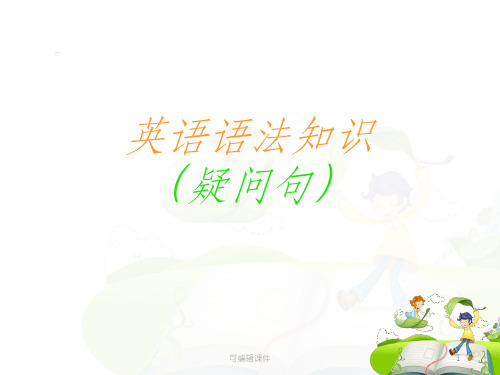
可编辑课件
4
e.g
This is Amy's bike.(一般疑问句)
Is this Amy's bike?
Yes, this is. (肯定回答)错误
No, this isn‘t. (否定回答)错误
Did you go to Beijing last weekend?
Yes, I did. (肯定回答)
2、如句子里是动词就在这些词前加 don't,doesn't,didn't
(1)主语是第一、二人称(复数)加don’t,第三人称单数加
doesn't
(2)如果是过去式就加didn't
例:I like dogs.
She likes swimming.
I don‘t like dogs.
She doesn’t like swimming.
No, I didn't. (否定回答)
I have some books. (一般疑问句)
Do you have any b可o编辑o课件ks?
5
变否定句的做法:
1、如句子里是be动词:am,is,are,was,were 就在这些词后加 not
例: He is Tom.
He is not Tom.
( B) 25. ______ tea did you have?
Two cups. • How many B. How much C. How soon D. Which
可编辑课件
15
感谢亲观看此幻灯片,此课件部分内容来源于网络, 如有侵权请及时联系我们删除,谢谢配合!
感 谢 阅
读感
谢
特殊疑问句及一般疑问句的用法
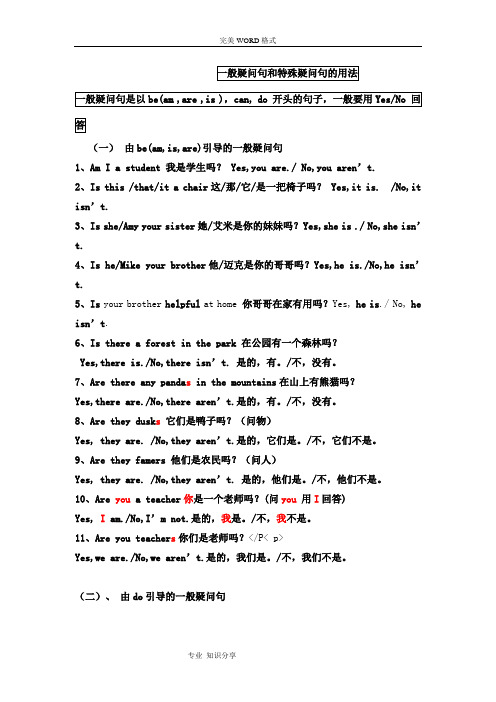
(一)由be(am,is,are)引导的一般疑问句1、Am I a student 我是学生吗? Yes,you are./ No,you aren’t.2、Is this /that/it a chair这/那/它/是一把椅子吗? Yes,it is. /No,it isn’t.3、Is she/Amy your sister她/艾米是你的妹妹吗?Yes,she is ./ No,she isn’t.4、Is he/Mike your brother他/迈克是你的哥哥吗?Yes,he is./No,he isn’t.5、Is your brother helpful at home 你哥哥在家有用吗?Yes, he is./ No, he isn’t.6、Is there a forest in the park 在公园有一个森林吗?Yes,there is./No,there isn’t. 是的,有。
/不,没有。
7、Are there any panda s in the mountains在山上有熊猫吗?Yes,there are./No,there aren’t.是的,有。
/不,没有。
8、Are they dusk s它们是鸭子吗?(问物)Yes, they are. /No,they aren’t.是的,它们是。
/不,它们不是。
9、Are they famers 他们是农民吗?(问人)Yes, they are. /No,they aren’t. 是的,他们是。
/不,他们不是。
10、Are you a teacher你是一个老师吗?(问you 用I回答)Yes, I am./No,I’m not.是的,我是。
/不,我不是。
11、Are you teacher s你们是老师吗?</P< p>Yes,we are./No,we aren’t.是的,我们是。
/不,我们不是。
一般疑问句和特殊疑问句知识点总结

一般疑问句和特殊疑问句知识点总结疑问句最常见的疑问句有两类:1.一般疑问句:可以用Yes和No回答的问句2.特殊疑问句:以特殊疑问词7w1h(比如what/how等等)开头的疑问句一般疑问句(句型结构会根据时态发生相应的细微变化,但总体框架不变)①be动词+主语+其他?(注意be动词和主语的匹配)例句:Areyoua policeman?你是个警察吗?-Yes, I am.是的,我是。
-No, I am not.不,我不是。
②情态动词+主语+动词原形+其他?(注意情态动词后面跟动词原形)例句:Canyouswim?你会游泳吗?-Yes, I can.是的,我会。
-No, I can’t.不,我不会。
③助动词+主语+动词原形+其他?(注意助动词和主语的匹配)例句:Doyoulikedancing?你喜欢跳舞吗?-Yes, I do.是的,我喜爱。
-No, I don’t.不,我不喜欢。
Doyougoto school every day?你每天去学校吗?做句型转换的方法(如何将陈述句变成一般疑问句):先看句子中是否有be动词或者情态动词A.如果有be动词或者情态动词,对照一般疑问句句型①/②将be动词或者情态动词提到句首,其他局部依次照抄B.如果没有be动词或者情态动词,对照一般疑问句句型③句首+助动词(注意是不是要和主语婚配变化),其他局部依次照抄,注意原来的动词要变为真相#无论是哪种情况,都要注意第一人称要酿成第二人称,第二人称要酿成第一人称(you和I的切换)非凡疑问句(句型结构会根据时态发生相应的细微变化,但总体框架不变)①特殊疑问词(作主语)+谓语+其他?(陈述句语序)例句:Whois reading a book?谁正在读书?Whichis the biggest?哪个是最大的?Wholikes dancing?谁喜爱跳舞?②非凡疑问词(作主语修饰语)+主语+谓语+其他?(陈说句语序)例句:Whosebagis red?谁的包是红色的?How manypeoplework in the school?有多少人在学校工作?③特殊疑问词+一般疑问句(详见上面的一般疑问句结构)?(此情况为当特殊疑问词代替的部分不是主语或者主语修饰语时)例句:What areyoudoing?你在做什么?What colour doyoulike?你喜欢什么颜色?做句型转换的方法(如何将句子转变成特殊疑问句):先看划线局部是不是为句子中的主语或者主语修饰语A.如果是主语,对照非凡疑问句句型①划线部分用特殊疑问词代替,其他部分照抄(该疑问句为陈述句语序)B.如果是主语修饰语,对照特殊疑问句句型②划线部分用特殊疑问词代替,其他部分照抄(该疑问句为陈述句语序)C.如果不是主语或者主语修饰语,对照特殊疑问句句型③先将原来的陈述句变成一般疑问句(如果本来就是一般疑问句就不需要再做修改)划线局部用非凡疑问词替代再将特殊疑问词提前到句首#如果划线局部是动词或者动词短语,表示做什么事,那变为非凡疑问词的时候要用do what替代非凡疑问词主要分为两类:wh-(wh开头的疑问词)和how - (how开头的疑问词)疑问词whatwhowhosewhichwherewhenwhywhat for what colour what day what date what time 含义什么谁谁的哪一个在哪里什么时候为什么为什么什么颜色星期几什么日期几点钟用法问东西问人问归属问挑选问地址问时间问原因。
一般疑问句和特殊疑问句(讲义)通用版英语六年级下册

一般疑问句和特殊疑问句一般疑问句(1)概念:可以用Yes或者No来回答的疑问句是一般疑问句。
一般疑问句读的时候往往要用升调;译成汉语的时候常可以译为“......吗?”(2)结构:1、be动词+主语+其他肯定回答:Yes, ...am/ is /are.否定回答:No, ...am not./ isn’t / aren’t.例句1:Is this your English book?肯定回答: Yes,it is. / 否定回答: No,it isn't.例句2: Are these your English books?肯定回答: Yes,they are. / 否定回答: No,they aren't.2、情态动词+ 主语+ 动词原形+ 其它部分?肯定回答:Yes, ...can.否定回答:No, ...can’t.例句1:Can you speak English?肯定回答:Yes, I can. 否定回答:No, I can’t.例句2:Can he swim?肯定回答:Yes, he can. 否定回答:No, he can’t.3、助动词Do/Does+ 主语+动词原形+其他部分?肯定回答:Yes,...do/ does.否定回答:No, ...don’t/ doesn’t.例句1:Do you like flowers?肯定回答:Yes, I do. / 否定回答:No, I don’t.例句2:Does he like flowers?肯定回答:Yes, he does. / 否定回答:No, he doesn’t.(3)如何将陈述句变成一般疑问句?1、陈述句中有be动词(am, is , are等)或情态动词(can,must等)时,变成一般疑问句要将be动词和情态动词提到句首,句末加上问号即可,如果是第一人称,则要变成第二人称。
例如:She is a clever girl. → Is she a clever girl?I can swim. → Can you swim?2、句子里面含有实义动词(如like, likes, have,has, run, swim, jump等)。
小学五年级英语语法

小学五年级英语语法一、特殊疑问句表示疑问,有疑问词(在开头),回答有很多种可能。
常用疑问词:疑问词意思用法What time 什么时间问具体时间,如几点钟Who 谁问人Whose 谁的问主人Where 在哪里问地点What 什么问东西、事物What colour 什么颜色问颜色How old 多大年纪问年纪How many 多少数量(可数名词)问数量How much 多少钱;多少数量(不可数名词)问多少钱或数量(不可数)二、一般疑问句如何将一个肯定的陈述句改为一般疑问句:1、看句中有无be动词,如有,把be动词提到句首即可。
2、看句中有无情态动词,如有,把情态动词提到句首即可。
3、如上述二者都没有,就应把助动提到句首。
分四个步骤:(1)肯定陈述句中本来是没有助动词的,要加上去,位置在主语(某人或某物)后,动词前。
(2)确定助动词用do还是does,根据句中动词,动词是原形的助动词就用do,动词是第三人称单数的助动词就用does(3)把助动词后提到句首。
(4)原句中动词假如发生变化就要恢复成原形。
强调一点,有some的要考虑是否要用any。
三、一般将来时表示将来将要发生的动作,经常和tomorrow, next year, the day after tomorrow, the year after the next, in five hours' time, etc. 表示将来的词联用。
结构:主语+助动词will+动词原形I will go to America tomorrow.The pilot will fly to Japan the month after the next.Jack will move into his new house tomorrow morning.★变疑问句将助动词移到句首Will you go to America tomorrow?Will the pilot fly to Japan the month after the next?Will Jack move into his new house tomorrow morning?★变否定句在助动词后面加notI will not go to America tomorrow.The pilot will not fly to Japan the month after the next.Jack will not move into his new house tomorrow morning.★肯定回答及否定回答Yes, I will. / No, I will not.Yes, he/she will. / No, he/she will not.Yes, he will. / No, he will not.★特殊疑问句What will you do?四、现在进行时表示现在正在进行的动作。
小学英语特殊疑问句和一般疑问句的归纳

特殊疑问句和一般疑问句的答法一般疑问句通常都是 1..以be (am,is,are,)开头2.以Do,Does,Did 开头或以Can开头回答方法:前面用什么提问的就用什么答。
只有两种回答方式:1)肯定的, Yes,主语 + 提问词.2)否定的 No,主语+提问词+not.【注意:问句与答句的第一二人称要互换】如:④主语是名字时的答语:看性别,男的用he ,女的用she ,其他的用it 复数就用they。
如:①Is she…… Is he……… Is it……..Yes, she is. Yes, he is. Yes, it is.No, she isn,t. No, he isn,t. No, it isn,t.②Are they……… Are the monkeys …….Yes, they are. Yes, they are.No,they aren’t No,they aren’t③ Do they……… Does he…….. Did she…….Yes,they do. Yes,he does. Yes, she did.No,they don’t. No,he doesn’t. No,she didn’t.④Are you…….. Are you…….. Do you…….Yes, I am. Yes, we are. Yes ,I do. 或 Yes,No, I am not. No, we aren’t. No,I don’t. 或No,⑤Does Mike……. Is ChenJi….. Do your parents…Yes ,he does. Yes , she is. Yes, they do.No,he doesn’t. No, she isn’t. No,they don’t.111v1.0 可编辑可修改一、专项练习。
1. Did ChenJie read books yesterday2. Can the girl cook the meals—————————————————————————————he going to swim this afternoon 4. Are they going to take a trip next weekend ————————————————————————————————5.Does he often go to school by bike 6. Do you play basketball every weekend ———————————————————————————————————7. Did Mike do his homework yesterday 8. Are they playing basketball now————————————————————————————————一般疑问句及特殊疑问句的总结一般疑问句的定义:用yes或no来回答的疑问句叫一般疑问句。
一般疑问句和特殊疑问句知识点总结

一般疑问句和特殊疑问句知识点总结一、一般疑问句。
1. 定义。
- 一般疑问句是用来询问某事是否属实,需要用“是(yes)”或“否(no)”来回答的疑问句。
例如:“Are you a student?”(你是一名学生吗?)2. 结构。
- be动词(am/is/are/was/were)开头的一般疑问句。
- 当句子中有be动词时,将be动词提到句首,句末加问号,句子中的主语如果是第一人称要变为第二人称。
- 肯定句:I am a teacher.(我是一名教师。
)- 一般疑问句:Are you a teacher?(你是一名教师吗?)- 其回答形式为:Yes, 主语+be动词. / No, 主语+be动词+not.- 例如:Are you from China? Yes, I am. / No, I'm not.- 助动词(do/does/did)开头的一般疑问句。
- 当句子中的谓语动词是实义动词,且句子时态为一般现在时(主语不是第三人称单数用do,主语是第三人称单数用does)或一般过去时(用did)时,将助动词提到句首,动词恢复原形,句末加问号。
- 肯定句:He likes apples.(他喜欢苹果。
)- 一般疑问句:Does he like apples?(他喜欢苹果吗?)- 肯定句:I played football yesterday.(我昨天踢足球了。
)- 一般疑问句:Did you play football yesterday?(你昨天踢足球了吗?)- 回答形式为:Yes, 主语+do/does/did. / No, 主语+don't/doesn't/didn't.- 例如:Do they go to school by bike? Yes, they do. / No, they don't.- 情态动词(can/could/may/must等)开头的一般疑问句。
一般疑问句和特殊疑问句的用法、结构、回答详细总结归纳

一般疑问句和特殊疑问句的结构、用法、回答详细总结讲解唐赳学英语,必须弄懂英语最基本的两种疑问句,即:一般疑问句和特殊疑问句。
一、一般疑问句一般疑问句是疑问句的一种。
它是指用yes(是)或no(不是)来回答的句子。
翻译成汉语,凡是句末都带有“吗?”的疑问句都是一般疑问句。
1、一般疑问句的总体基本结构:其结构是:系动词be / 助动词/情态动词+主语+其他成分+?如:Are you a student? 你是学生吗?2、一般疑问句的回答方式:肯定回答:Yes,主语+提问的be/助动词/情态动词.如上句:Are you a student? 你是学生吗?肯定回答就是:Yes, I am. 是的,我是。
否定回答:No,主语+提问的be / 助动词/ 情态动词的否定形式(not).如上句:Are you a student? 你是学生吗?否定回答就是:No, I am not.3、英语中的一般疑问句分为两种主要的形式:第一大类:为含有be动词(is am are,was, were)或情态动词的一般疑问句,其结构为:be+主语+其它部分+?情态动词+主语+动词原形+其它部分+?肯定回答用“Yes,主语+be \ 情态动词.”,否定回答用“No,主语+be \ 情态动词+not.”。
be或情态动词和not可用缩写形式,主要有isn’t,aren’t,wasn’t,weren’t,can’t,mustn’t,needn’t等。
例1:Is this your English book?这是你的英语书吗?肯定回答:Yes,it is. 是的,它是(我的)。
否定回答:No,it isn`t. 不,它不是(我的)。
例2:Are these your English books?这些是你的英语书吗?肯定回答:Yes,they are. 是的,它们是。
否定回答:No,they aren’t.不,它们不是。
例3: Can you speak English? 你能讲英语吗?(本句式含有情态动词can 的一般疑问句)肯定回答:Yes,I can. 是的,我能。
小学英语语法详解疑问句--一般疑问句、特殊疑问句
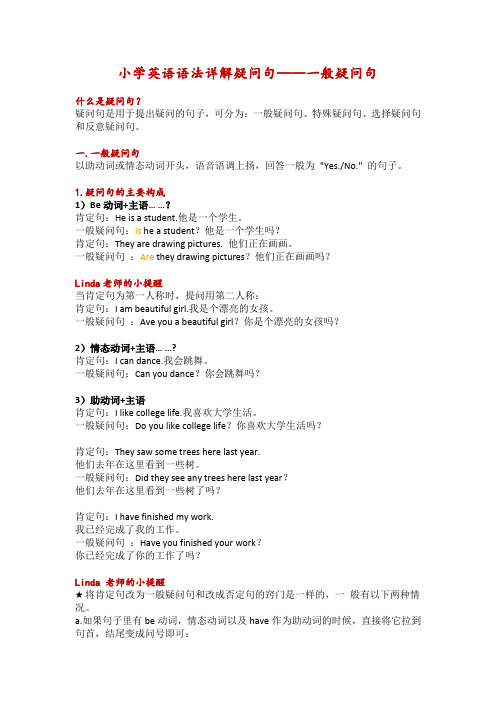
小学英语语法详解疑问句——一般疑问句什么是疑问句?疑问句是用于提出疑问的句子,可分为:一般疑问句、特殊疑问句、选择疑问句和反意疑问句。
一.一般疑问句以助动词或情态动词开头,语音语调上扬,回答一般为"Yes./No." 的句子。
1.疑问句的主要构成1)Be动词+主语… …?肯定句:He is a student.他是一个学生。
一般疑问句:Is he a student?他是一个学生吗?肯定句:They are drawing pictures. 他们正在画画。
一般疑问句:Are they drawing pictures?他们正在画画吗?Linda老师的小提醒当肯定句为第一人称时,提问用第二人称:肯定句:I am beautiful girl.我是个漂亮的女孩。
一般疑问句:Ave you a beautiful girl?你是个漂亮的女孩吗?2)情态动词+主语… …?肯定句:I can dance.我会跳舞。
一般疑问句:Can you dance?你会跳舞吗?3)助动词+主语肯定句:I like college life.我喜欢大学生活。
一般疑问句:Do you like college life?你喜欢大学生活吗?肯定句:They saw some trees here last year.他们去年在这里看到一些树。
一般疑问句:Did they see any trees here last year?他们去年在这里看到一些树了吗?肯定句:I have finished my work.我已经完成了我的工作。
一般疑问句:Have you finished your work?你已经完成了你的工作了吗?Linda 老师的小提醒★将肯定句改为一般疑问句和改成否定句的窍门是一样的,一般有以下两种情况。
a.如果句子里有be动词,情态动词以及have作为助动词的时候,直接将它拉到句首,结尾变成问号即可:He is twelve.→ Is he twelve?She can swim.→ Can she swim?I have got it.→ Have you got it?b.当句子里是实义动词时,我们也可以用一些小窍门:肯定句:I go to the park.我去公园。
一般疑问句和特殊疑问句
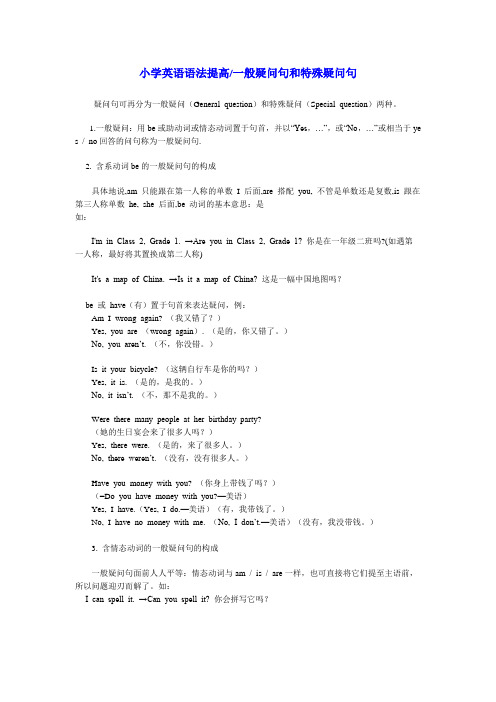
小学英语语法提高/一般疑问句和特殊疑问句疑问句可再分为一般疑问(General question)和特殊疑问(Special question)两种。
1.一般疑问:用be或助动词或情态动词置于句首,并以“Yes,…”,或“No,…”或相当于ye s / no回答的问句称为一般疑问句.2. 含系动词be的一般疑问句的构成具体地说,am 只能跟在第一人称的单数I 后面,are 搭配you, 不管是单数还是复数,is 跟在第三人称单数he, she 后面,be 动词的基本意思:是如:I'm in Class 2, Grade 1. →Are you in Class 2, Grade 1? 你是在一年级二班吗?(如遇第一人称,最好将其置换成第二人称)It's a map of China. →Is it a map of China? 这是一幅中国地图吗?be 或have(有)置于句首来表达疑问,例:A m I wrong again? (我又错了?)Yes, you are (wrong again). (是的,你又错了。
)No, you aren’t. (不,你没错。
)Is it your bicycle? (这辆自行车是你的吗?)Yes, it is. (是的,是我的。
)No, it isn’t. (不,那不是我的。
)Were there many people at her birthday party?(她的生日宴会来了很多人吗?)Yes, there were. (是的,来了很多人。
)No, there weren’t. (没有,没有很多人。
)Have you money with you? (你身上带钱了吗?)(=Do you have money with you?—美语)Yes, I have.(Yes, I do.—美语)(有,我带钱了。
)No, I have no money with me. (No, I don’t.—美语)(没有,我没带钱。
小学英语重点疑问句归纳

小学英语重点问句归纳小学英语教材中出现的问句主要有两种,一种是由特殊疑问词引导的特殊疑问句;一种是一般疑问句。
特殊疑问句的回答应该根据具体情况作出具体的回答。
一般疑问句应该根据具体情况用Yes或No来回答.现将这两种疑问句归纳如下:第一部分特殊疑问句一般疑问句由特殊疑问词来引导。
常见的特殊疑问词主要有:What, How, Who,Where, When, Why, Which,等。
现按照特殊疑问词的不同对小学疑问句做如下归纳。
一、What及What短语引导的特殊疑问句:(一)问姓名(What):1. -What’s your name? -你叫什么名字?—My name is Chen Jie。
—我叫陈洁。
2. —What's his name?—他叫什么名字?-His name is Zhang Peng. —他叫张鹏。
3. —What’s her name? -她叫什么名字?—Her name is Amy. —她叫Amy.(二) 问事物(What):1. —What’s this (that)? -这(那)是什么?—It’s a hat。
-它是一顶帽子。
2。
-What are these (those)? -这些(那些)是什么?-They are tomatoes. —它们是西红柿。
3。
—What's in the classroom?—教室里有什么?—One blackboard, one TV,—一个黑板,一个电视, many desks and chairs。
许多课桌和椅子。
4. —What’s in the room?—房间里有什么?-There is a table beside the bed. —在床的旁边有一张桌子。
5。
—What’s your favourite food(season)? -你最喜欢的食物(季节)是什么?—Salad(Summer). —色拉(夏天)。
小学英语一般疑问句和特殊疑问句(附练习题)
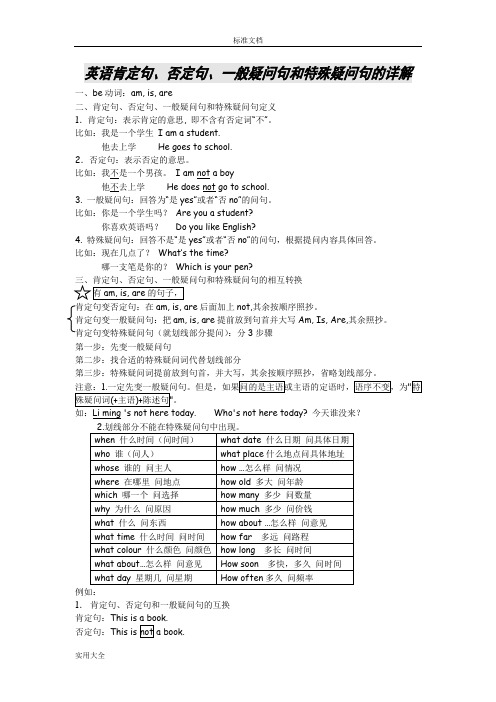
英语肯定句、否定句、一般疑问句和特殊疑问句的详解一、be动词:am, is, are二、肯定句、否定句、一般疑问句和特殊疑问句定义1.肯定句:表示肯定的意思, 即不含有否定词“不”。
比如:我是一个学生I am a student.他去上学He goes to school.2.否定句:表示否定的意思。
比如:我不是一个男孩。
I am not a boy他不去上学He does not go to school.3. 一般疑问句:回答为“是yes”或者“否no”的问句。
比如:你是一个学生吗?Are you a student?你喜欢英语吗?Do you like English?4. 特殊疑问句:回答不是“是yes”或者“否no”的问句,根据提问内容具体回答。
比如:现在几点了?What’s the time?哪一支笔是你的?Which is your pen?am, is, are后面加上not,其余按顺序照抄。
肯定句变一般疑问句:把am, is, are提前放到句首并大写Am, Is, Are,其余照抄。
:分3步骤第一步:先变一般疑问句第二步:找合适的特殊疑问词代替划线部分第三步:特殊疑问词提前放到句首,并大写,其余按顺序照抄,省略划线部分。
如:Li ming 's not here today.Who's not here today? 今天谁没来?例如:1.肯定句、否定句和一般疑问句的互换肯定句:否定句:一般疑问句:Is this a book?肯定回答:Yes, it is.否定回答:No, it isn’t.2.就划线部分提问(变特殊疑问句)This is a book.第一步:变一般疑问句Is this a book?第二步:找合适的特殊疑问词Is this what ?第三步:特殊疑问词提前放到句首,并大写,其余按顺序照抄,省略划线部分。
do not或者does not,其余按顺序照抄动词用原形肯定句变一般疑问句:在句首加do或者does并大写,其余照抄。
小学英语一般疑问句和特殊疑问句

Whose book is this?(单数)
It’s Ann’s.
表示“谁的”
Whose books are these?(复数)
They’re Ann’s.
How much
How much is the book?
It’s ten yuan.
表示“多少钱”
How many
How many books are there?
There are five.
表示“多少数量”
总结:①单数用is复数用are,单数问题单数答,复数问题复数答;
②whose表示“谁的”,回答要有“的”,How much回答有“yuan”
③看到“Is ......或者Are......”开头的问句,回答要有Yes或No。
No, I can’t.
特殊疑问句:对句中的某一成分提问,不用yes和no来回答
疑问词
问
答
用法
what
at is this?(单数)
It’s a ruler.
表示“什么”
What are these?(复数)
They are rulers.
who
Who’s that?
That’s Ann.
表示“谁”
Yes, they are.
No, they aren’t.
Do开头
Do you like panda?
Yes, I do.
No, I don’t.
Does开头
Does he like cat?
Yes, he does.
No, he doesn’t.
Can开头
Can you jump?
Yes, I can.
一般疑问句、特殊疑问句的构成形式及基本用法
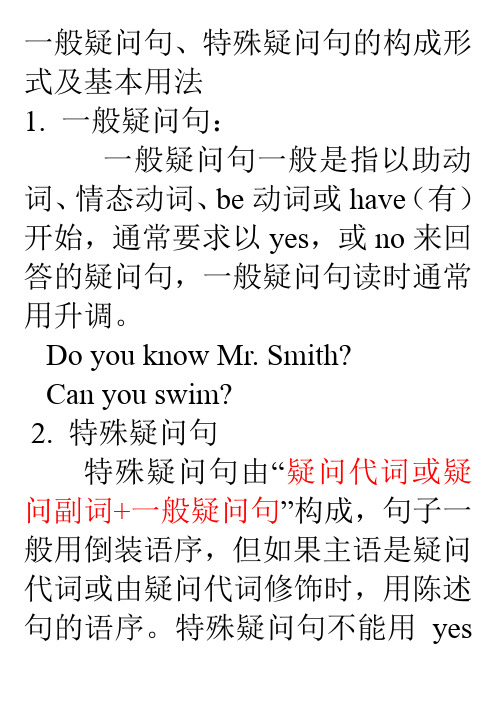
一般疑问句、特殊疑问句的构成形式及基本用法1. 一般疑问句:一般疑问句一般是指以助动词、情态动词、be动词或have(有)开始,通常要求以yes,或no来回答的疑问句,一般疑问句读时通常用升调。
Do you know Mr. Smith?Can you swim?2. 特殊疑问句特殊疑问句由“疑问代词或疑问副词+一般疑问句”构成,句子一般用倒装语序,但如果主语是疑问代词或由疑问代词修饰时,用陈述句的语序。
特殊疑问句不能用yes或no回答,读时用降调。
例如:Who is on duty today?How long have you been in Beijing? What time do you get up every morning?What must I do now?3. 注意疑问词的选择1. 问“谁”用who或whom。
如:Who is a doctor?Li Lei is a doctor.(对主语提问用who,对宾语提问用who,whom均可)2. 问“谁的”用whose。
如:Whose book is this?This is his book.3. 问“地点”用where。
如:Where is the ball?The ball is under the bed.4. 问“原因”用why。
如:Why didn't he come?He didn't come because he was ill.5. 问“身体状况”用how。
如:How are you?I'm fine.6. 问“方式”用how。
如:How did he do it?He did it in that way.7. 问“程度”用“how +被修饰语”。
如:How wide is the river?The river is five metres wide.8. 问“多少”用how much或how many。
英语一般疑问句和特殊疑问句
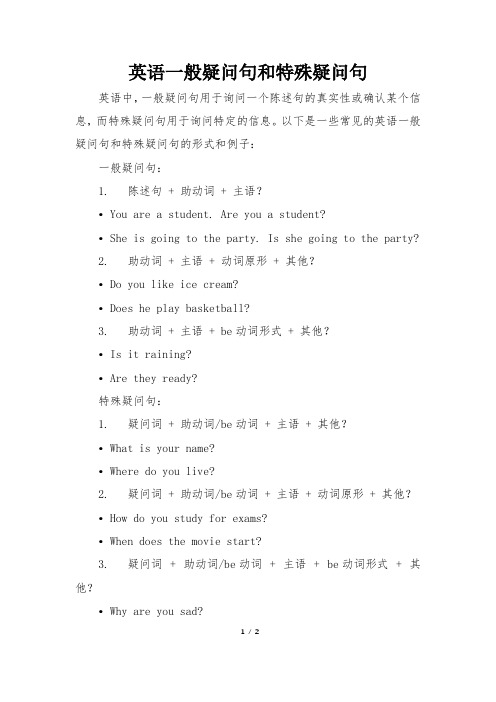
英语一般疑问句和特殊疑问句英语中,一般疑问句用于询问一个陈述句的真实性或确认某个信息,而特殊疑问句用于询问特定的信息。
以下是一些常见的英语一般疑问句和特殊疑问句的形式和例子:
一般疑问句:
1. 陈述句 + 助动词 + 主语?
• You are a student. Are you a student?
• She is going to the party. Is she going to the party?
2. 助动词 + 主语 + 动词原形 + 其他?
• Do you like ice cream?
• Does he play basketball?
3. 助动词 + 主语 + be动词形式 + 其他?
• Is it raining?
• Are they ready?
特殊疑问句:
1. 疑问词 + 助动词/be动词 + 主语 + 其他?
• What is your name?
• Where do you live?
2. 疑问词 + 助动词/be动词 + 主语 + 动词原形 + 其他?
• How do you study for exams?
• When does the movie start?
3. 疑问词+ 助动词/be动词+ 主语+ be动词形式+ 其他?
• Why are you sad?
1/ 2
• Who is the president?
请注意,疑问词在特殊疑问句中起到引导作用,用来询问特定的信息,如人物、时间、地点、方式、原因等。
同时,一般疑问句可以通过简单的肯定或否定回答,而特殊疑问句需要提供具体的信息作为回答。
2/ 2。
小学英语一般疑问句和特殊疑问句总结

小学英语一般疑问句和特殊疑问句总结小学语法之疑问句一、一般疑问句一般疑问句是指可以用Yes或No作答的疑问句。
这种疑问句通常以be动词、助动词或情态动词开头,句末读升调。
肯定陈述句可以通过两种方式变成一般疑问句。
首先,如果原句中有be动词或情态动词,将其提到句首,句末加问号即可。
其次,如果原句中没有be动词或情态动词,需要在主语前加助动词(一般现在时do、does、一般过去时did),并将谓语动词变回原形。
需要注意的是,如果陈述句中有第一人称,则变问句时要变为第二人称。
另外,如果陈述句中有some,则变问句时往往要变成any。
一般疑问句的回答可以用Yes或No,并在主语后加上相应的be动词、助动词或情态动词。
如果回答是否定的,则需要在be动词、助动词或情态动词后面加上not的否定形式缩写。
Can she dance。
Yes。
she can.When asked if she can dance。
XXX。
If the subject of the n is "this" or "that"。
the answer should use "it" instead。
If the subject is "these" or "those"。
the answer should use "they" instead.Is this your bag?Yes。
it is。
/ No。
it isn't.Are those your books?Yes。
they are。
/ No。
they aren't.Practice:1.What did his father do for a living?2.Why are these cats crying?3.Who can swim?4.How did you go to school?5.How does his XXX work?6.Can Mrs。
一般疑问句及特殊疑问句总结(针对小学阶段学生)
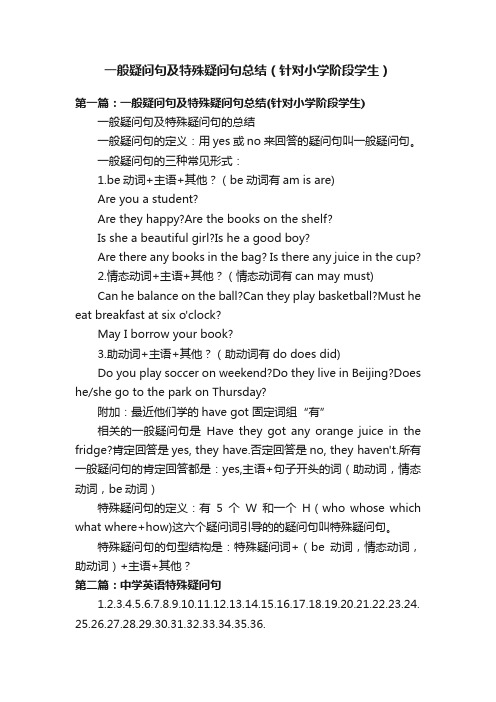
一般疑问句及特殊疑问句总结(针对小学阶段学生)第一篇:一般疑问句及特殊疑问句总结(针对小学阶段学生) 一般疑问句及特殊疑问句的总结一般疑问句的定义:用yes或no来回答的疑问句叫一般疑问句。
一般疑问句的三种常见形式:1.be动词+主语+其他?(be动词有am is are)Are you a student?Are they happy?Are the books on the shelf?Is she a beautiful girl?Is he a good boy?Are there any books in the bag? Is there any juice in the cup?2.情态动词+主语+其他?(情态动词有can may must)Can he balance on the ball?Can they play basketball?Must he eat breakfast at six o'clock?May I borrow your book?3.助动词+主语+其他?(助动词有do does did)Do you play soccer on weekend?Do they live in Beijing?Does he/she go to the park on Thursday?附加:最近他们学的have got 固定词组“有”相关的一般疑问句是Have they got any orange juice in the fridge?肯定回答是yes, they have.否定回答是no, they haven't.所有一般疑问句的肯定回答都是:yes,主语+句子开头的词(助动词,情态动词,be动词)特殊疑问句的定义:有5个W和一个H(who whose which what where+how)这六个疑问词引导的的疑问句叫特殊疑问句。
特殊疑问句的句型结构是:特殊疑问词+(be动词,情态动词,助动词)+主语+其他?第二篇:中学英语特殊疑问句1.2.3.4.5.6.7.8.9.10.11.12.13.14.15.16.17.18.19.20.21.22.23.24.25.26.27.28.29.30.31.32.33.34.35.36.What subject do you like? Ilike English/Chinese/Math/history etc.What school are you in? I am in NO.6 middle school.What’s your favorite subject? My favorite subject is English.What animal do you like? I like dogs/cats/sheep etc.What sport can you do? I can play basketball/football/badminton/volleyball etc.How mangy people are there in your family? There are four people in my family.How do you go to school? I go to school on foot/by car/by bus etc.How many English lessons do you have a week? I have 6 English lessons a week.What do you usually do after school? I usually do my homework, watch TV, play computer games after school.When do you go to bed every day? I go to bed at 9 o’clock.What do you do before sleep? I read books before slee p.When’s your birthday? My birthday is on June the 19th.How many months are there in a year? There are 12 months in a year.What’s your favorite holiday? My favorite holiday is summer holiday.How many seasons are there in a year? There are 4 seasons in a year.What season do you like best? I like summer best.What do American children do on Christmas? They will go shopping and buy lots of gifts and decorate their houses.What do you usually do at the weekends? I usually do my homework and play games with my fri ends.What do you do on Children’s day? I play games with my friends and have a big dinner with my parents.What present do you want to get on Children’s Day? I want to get an English dictionary on Children’s Day.What’s your father’s job? My father is an off icer.Where is your home? My home is in Macao.Which floor do you live? I live on the second floor.What do you usually buy when you go to supermarket? I usually buy some delicious food and fruit.Withwhom you often play table tennis? I often play table tennis with my father.What do you like doing at the PE lessons? I like playing football and basketball.What do you usually do after lunch? I usually have a sleep after lunch.What food do you like? I like KFC.What time do you usually go to school? I usually go to school at 7:00.How does your father go to work? He goes to work by car.What will you do when you grow up? I want to be an English teacher when I grow up.What will you do if you have 5,000,000 yuan? I want to travel around the world and buy a villa in the countryside.Which do you prefer, country life or city life? I like country life because it is more comfortable.What’s the motto of Olympic? Faster, higher, stronger.What’s Hangzhou famous for? West Lake.Which country do you want to go first if you have a lot of money? I want to go to Canada.第三篇:反义疑问句特殊用法总结1.当陈述部分的主语是I,而句子又用来征询对方的意见时,附加疑问句中的主语用you。
- 1、下载文档前请自行甄别文档内容的完整性,平台不提供额外的编辑、内容补充、找答案等附加服务。
- 2、"仅部分预览"的文档,不可在线预览部分如存在完整性等问题,可反馈申请退款(可完整预览的文档不适用该条件!)。
- 3、如文档侵犯您的权益,请联系客服反馈,我们会尽快为您处理(人工客服工作时间:9:00-18:30)。
特殊疑问句和一般疑问句的答法一般疑问句通常都是1..以be (am,is,are,)开头2.以Do,Does,Did 开头或以Can开头回答方法:前面用什么提问的就用什么答。
只有两种回答方式:1)肯定的,Yes,主语+ 提问词.2)否定的No,主语+提问词+not.【注意:问句与答句的第一二人称要互换】如:④主语是名字时的答语:看性别,男的用he ,女的用she ,其他的用it 复数就用they。
如:①Is she……? Is he………? Is it……..?Yes, she is.Yes, he is. Yes, it is.No, she isn,t. No, he isn,t. No, it isn,t.②Are they………? Are the monkeys …….?Yes, they are.Yes, they are.No,they aren’t No,they aren’t③Do they………?Does he……..? Did she…….?Yes,they do. Yes,he does. Yes, she did.No,they don’t. No,he doesn’t. No,she didn’t.④Are you……..?Are you……..? Do you…….?Yes, I am.Yes, we are. Yes ,I do. 或Yes,No, I am not. No, we aren’t. No,I don’t. 或No,⑤Does Mike…….? Is ChenJi…..? Do your parents…?Yes ,he does.Yes , she is. Yes, they do.No,he doesn’t. No, she isn’t. No,they don’t.一、专项练习。
1. Did ChenJie read books yesterday?2. Can the girl cook the meals ?—————————————————————————————3.Is he going to swim this afternoon?4. Are they going to take a trip next weend? ————————————————————————————————5.Does he often go to school by bike ? 6. Do you play basketball every weekend? ———————————————————————————————————7. Did Mike do his homework yesterday? 8. Are they playing basketball now?————————————————————————————————一般疑问句及特殊疑问句的总结一般疑问句的定义:用yes或no来回答的疑问句叫一般疑问句。
一般疑问句通常都是1..以be (am,is,are,)开头2.以Do,Does,Did 开头或以Can开头只有两种回答方式:1)肯定的,Yes,主语+ 提问词.2)否定的No,主语+提问词+not.【注意:问句与答句的第一二人称要互换】如:④①Is she……? Is he………? Is it……..?Yes, she is.Yes, he is. Yes, it is.No, she isn,t. No, he isn,t. No, it isn,t.②Are they………? Are the monkeys …….?Yes, they are.Yes, they are.No,they aren’t No,they aren’t③Do they………?Does he……..? Did she…….?Yes,they do. Yes,he does. Yes, she did.No,they don’t. No,he doesn’t. No,she didn’t.一般疑问句练习二、请将下列各题做出肯定,否定回答:1.Is this a box? Yes, ___ _____.No,________ ________.2.Is Mike your brother? Yes,______ ________.No,_______ ________.3.Is Peter at home? Yes,______ ________.No,_______ ________.4.Did your uncle read books? Yes,______ _____No, _______5.Are they ducks? Yes,______ ________.No, _______ ________.6.Is this your T-shirt? Yes,______________. No,_______ ________.7.Is that a teacher `s desk? Yes, ________is. No, ________ is't.8.Does your brother like play football? Yes,______ ________.No, _______ ________.9.Can you use a computer? Yes,______ ________.No, _______ ________.10.Is there a forest in the park? Yes,______ ________.No, _______ ________.11.Are there any fish in the rivers? Yes,______ ________.No, _______ ________.12.Is the trash bin behind the door? Yes,______ ________.No, _______ ________.三、将下列句子变成一般疑问句1 Mr Wang is thirsty.__________________________?2.The elephent’s ears are long.__________________________?3. We like birds._________________________?4.Hello.You are his mother.__________________________?5.I can sing and dance.___________________________?6. I am listening to music. _______________________________________?7. Mike is a student. _______________________________________?8. Tom can clean the classroom. ________________________________________?9. They are in the zoo. ________________________________________?10. There are some flowers in the vase._____________________________________?11. This is my sister. _________________________________________?12. We are sweeping on the floor. __________________________________________?13. We need some masks. _________________________________?14. They like making the puppet. _________________________________?15. Su Hai and Su Yang live in a new house.________________________________?16. I put a book on my head. ___________________________________?17. They sing “In the classroom”together. _________________________________?18. We play basketball on Sundays. ____________________________________?19. Tom likes listening to music. ____________________________________?所有一般疑问句的肯定回答都是:yes,主语+句子开头的词(助动词,情态动词,be动词)否定回答都是:No,主语+句子开关的词(助动词,情态动词,be动词)特殊疑问句的定义:疑问词引导的的疑问句叫特殊疑问句。
特殊疑问句的句型结构是:特殊疑问词+(be动词,情态动词,助动词)+主语who is that man?What can you see?What class do you have today?特殊疑问句常用疑问词:5. A: ______ _______is it? B: It is purple.6. A: ______ _______ is the sky? B: The sky is blue.7. A: ______ _______ is your coat? B: My coat is black.8. A: ______ _______ is the dog? B: The dog is white.9. A: ______ _______ is today? B: Today is Monday.10. A: ______ _______ is tomorrow? B: Tomorrow is Tuesday.11. A: ______ _______ was yesterday(昨天)? B: Yesterday was Sunday.12. A: ______ _______ do you like? B: I like red.13. A: ______ is this? This is a computer(电脑).14. A: ______ are you doing? B: We are playing basketball.15. A: ______ does your mother do? B: My mother is a policewoman.16. A: ______ are those? B: Those are peppers(辣椒).17. A: ______ is in the box? B: A lovely doll is in the box.18. A: ______ is on the table? B: The apple is on the table.19. A: ______ is in the classroom? The blackboard is in the classroom.20. A: ______ ______ ______? B: Mary is hungry.21. A: ______ ______ ______ ______ ______?B: My favorite color is pink.22. A: ______ ______ ______ ______? B: Nick is playing table tennis.二.连线:(Match)1. What's on the chair? There is a book in the bag.2. How is your father? These are apples.3. What are these? I go to school by bus.4. What is in the bag? The radio is on the chair.5. How do you go to school? My father is fine.6. How much is it? I wash my face in the morning.7. What time is it? I have two hands.8. When do you wash your face? It is four o'clock.9. How many hands do you have? It is 5 RMB(人民币).10.When do you have lunch? I have lunch at noon.语法专项练习题—特殊疑问句I.对画线部分提问、1.They bought a new bike yesterday.____________________________________________________ 2.She is a nurse .____________________________________________________ 3.She is my teacher.____________________________________________________4.He bought the red one .____________________________________________________5.It is my coat .____________________________________________________6.I am looking for my sister .____________________________________________________7.I get up at six .____________________________________________________8.I am from Hubei .____________________________________________________9.I went to school late because I got up late.____________________________________________________10. It is windy ._____________________________________________________11. I am getting on well with it._____________________________________________________12. My bag is red .______________________________________________________13. The book is Li Hua’s.______________________________________________________14. I like math best.______________________________________________________15. They are five yuan .______________________________________________________16. I wash it twice a week .______________________________________________________17. He will be back in four days .______________________________________________________18. I didn’t come to class yesterday because I was ill .______________________________________________________II.选择题( ) 19. Excuse me ______ is the nearest bookshop ?Go down the street and turn left at the second corner?A. howB. whatC. whereD. who( ) 20. ______ is a ticker for the film Hacker He?About forty yuan .A. How oldB. How manyC. How muchD. How often ( ) 21. —______ are you going? —I’m going to the library.A. WhoB. WhichC. WhatD. Where( ) 22. It’s a nice car. ______ have you been in it?Just to Shanghai.A. How muchB. How soonC. How longD. How far( ) 23. ______? It’s eight.A. What day is itB. What’s five and threeC. How old are youD. What’s your telephone number( ) 24. —______? —I’ve got a headache and a cough.A. What’s your troubleB. What’s wrong with itC. Can I help youD. How are you( ) 25. ______ tea did you have?Two cups.A. How manyB. How muchC. How soonD. Which( ) 26. ______ shall we meet in the park?What about half past eight?A. WhatB. WhenC. WhereD., Which( ) 27. ______ a year does your school have sports meetings?Twice a year.A. How oftenB. How soonC. How longD. How many times ( )28. ______?The one behind the tree.A. Whose girlB. Who’s that girlC. Which girlD. Where’s the girl ( )29. ______ are you going to be in the future?I want to be a person _____- Yang Liwei.A. How , likeB. How , asC. What , likeD. What , as( )30.______ will your father be back? .A How longB how oftenC How soonD How wideIII就划线部分提问。
